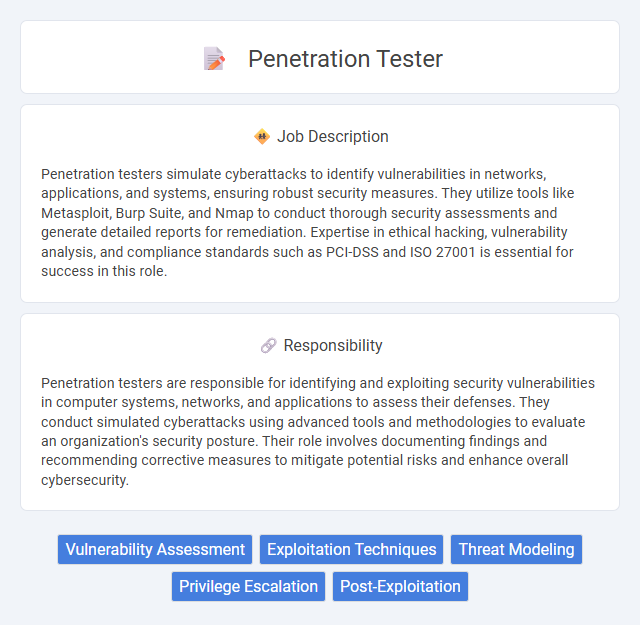
Penetration testers simulate cyberattacks to identify vulnerabilities in networks, applications, and systems, ensuring robust security measures. They utilize tools like Metasploit, Burp Suite, and Nmap to conduct thorough security assessments and generate detailed reports for remediation. Expertise in ethical hacking, vulnerability analysis, and compliance standards such as PCI-DSS and ISO 27001 is essential for success in this role.
Individuals who thrive as penetration testers often possess strong analytical skills, attention to detail, and a persistent mindset, which increase the likelihood of success in this role. Those comfortable with continuous learning and handling high-pressure situations may be more suitable due to the evolving nature of cybersecurity threats. People who prefer structured environments and lower-risk tasks might find this career less fitting, given the dynamic and sometimes unpredictable workload.
Qualification
A penetration tester must have strong knowledge of cybersecurity principles, ethical hacking techniques, and proficiency in tools like Metasploit, Nmap, and Burp Suite. Certifications such as CEH (Certified Ethical Hacker), OSCP (Offensive Security Certified Professional), and CISSP (Certified Information Systems Security Professional) significantly enhance job qualifications. Practical experience in vulnerability assessment, network security, and coding languages like Python or Bash is essential to effectively identify and exploit system weaknesses.
Responsibility
Penetration testers are responsible for identifying and exploiting security vulnerabilities in computer systems, networks, and applications to assess their defenses. They conduct simulated cyberattacks using advanced tools and methodologies to evaluate an organization's security posture. Their role involves documenting findings and recommending corrective measures to mitigate potential risks and enhance overall cybersecurity.
Benefit
Penetration testers likely benefit from high demand in cybersecurity, offering strong job security and competitive salaries. Access to cutting-edge technologies and continuous learning opportunities may enhance career growth. The role could provide intellectual challenge and the satisfaction of helping organizations protect sensitive data.
Challenge
Penetration tester roles likely involve continuous challenges requiring adaptation to evolving cybersecurity threats and exploiting system vulnerabilities. The job probably demands strong problem-solving skills to anticipate attackers' methods and identify security weaknesses before they can be exploited. Constant learning and innovative thinking appear essential to successfully protect organizations against increasingly sophisticated attacks.
Career Advancement
Penetration testers demonstrate expertise in identifying and exploiting security vulnerabilities, which positions them for roles such as security analyst, cybersecurity consultant, or ethical hacker. Gaining certifications like OSCP, CEH, or CISSP significantly enhances career progression opportunities and salary potential. Experienced penetration testers often transition into leadership roles like security architect or chief information security officer (CISO), driving enterprise-wide cybersecurity strategies.
Key Terms
Vulnerability Assessment
A penetration tester specializes in identifying security weaknesses through comprehensive vulnerability assessment techniques, including automated scanning and manual testing of networks, applications, and systems. They analyze potential exploits to prioritize risk mitigation strategies, ensuring robust defense against cyber threats. Expertise in tools like Nessus, Metasploit, and Burp Suite enhances accuracy in detecting and reporting security gaps.
Exploitation Techniques
Penetration testers specialize in exploitation techniques that identify security vulnerabilities by simulating real-world cyberattacks on networks, applications, and systems. They employ methods such as buffer overflows, SQL injection, cross-site scripting (XSS), and privilege escalation to exploit weaknesses and demonstrate potential impacts. Mastery of tools like Metasploit, Burp Suite, and custom scripts is essential for effective vulnerability exploitation and comprehensive security assessments.
Threat Modeling
Penetration testers excel in identifying security vulnerabilities through comprehensive threat modeling, which involves analyzing potential attack vectors and system weaknesses before actual exploitation. This proactive approach enables the anticipation of cyber threats, allowing for the development of targeted mitigation strategies and enhancing overall network defense. Expertise in tools such as STRIDE and DREAD frameworks is essential for effective threat modeling and risk assessment in penetration testing.
Privilege Escalation
Penetration testers specialize in identifying security vulnerabilities by exploiting privilege escalation techniques to gain unauthorized access to higher-level system permissions. They simulate cyberattack scenarios to uncover weaknesses in operating systems, applications, and network configurations that allow attackers to expand their control. Mastery of privilege escalation tools and methods is essential for delivering comprehensive security assessments and strengthening organizational defenses.
Post-Exploitation
Penetration testers specializing in post-exploitation leverage advanced techniques to maintain access, escalate privileges, and extract sensitive data after initial system compromise. Mastery of tools such as Metasploit, Mimikatz, and PowerShell Empire is critical for manipulating compromised environments and bypassing security controls. Their expertise enhances vulnerability assessment by demonstrating real-world attack impacts and helping organizations strengthen defenses against persistent cyber threats.
 kuljobs.com
kuljobs.com